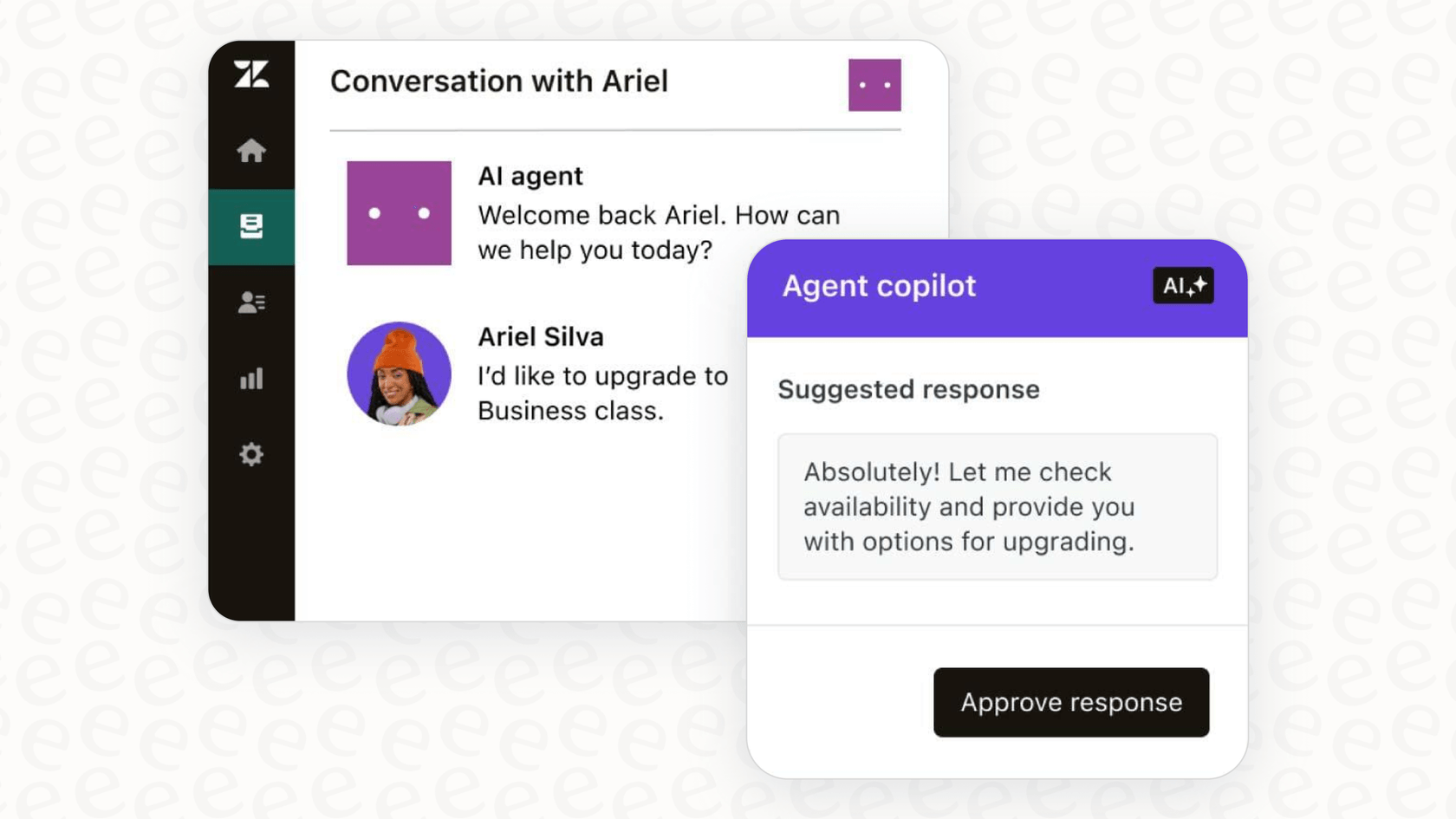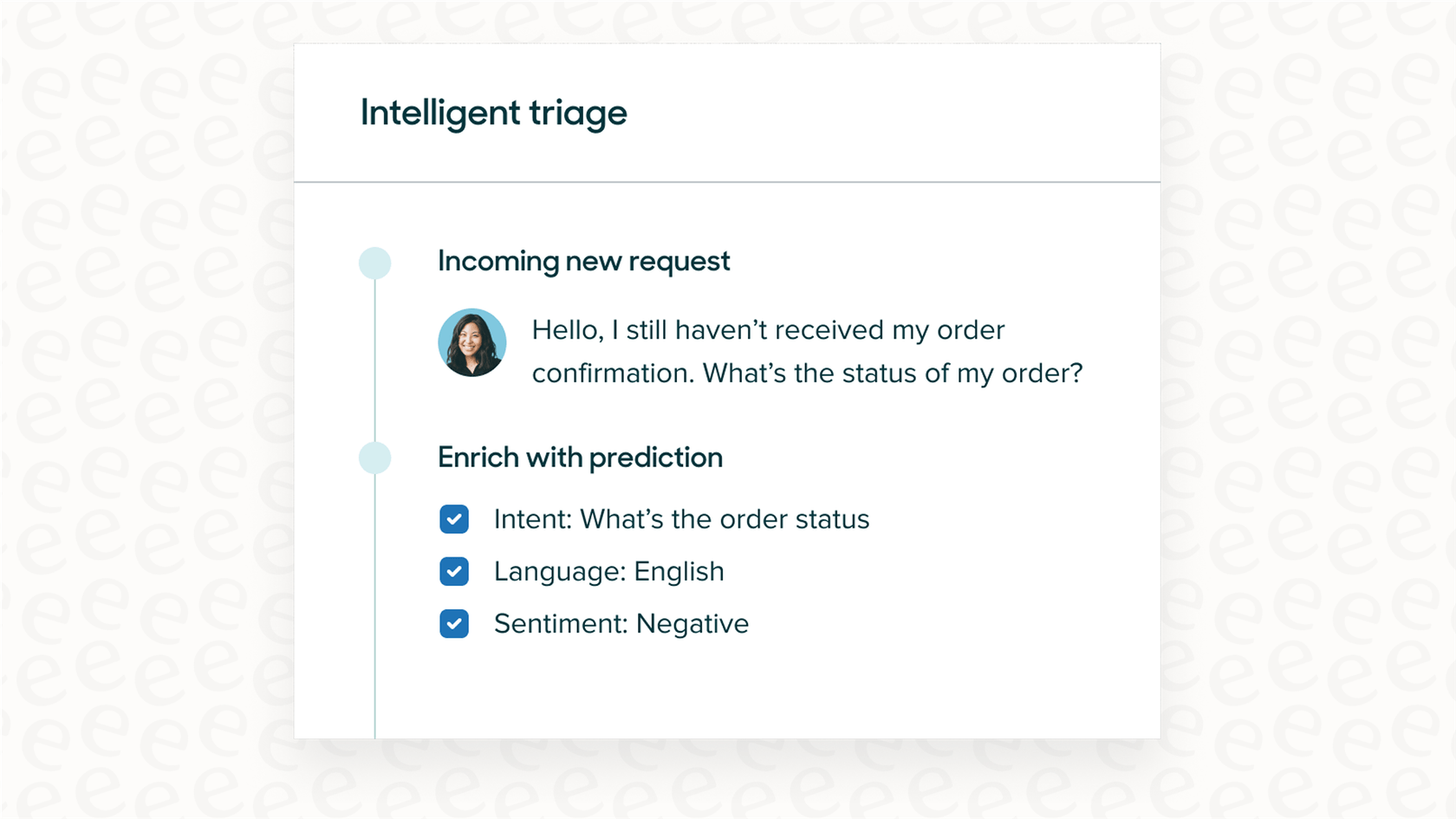A complete guide to every Zendesk AI capability in 2026

Kenneth Pangan

Katelin Teen
Last edited January 12, 2026
Expert Verified

Let's be real: support teams are working hard to stay ahead. You're constantly trying to resolve tickets faster, keep customers happy, and maintain a high standard of service. AI is a powerful tool for these goals, offering the ability to automate repetitive tasks and free up your team for high-value work. As a market leader, Zendesk provides a mature and reliable platform that powers customer service for thousands of companies. Understanding how its AI features, setup, and tiered plans work will help you make the most of this impressive ecosystem.
This guide is here to provide a clear, professional breakdown of every Zendesk AI capability. We’ll explore what's available, where it fits in, and how to optimize it for your workflow. Zendesk has built an incredible suite of tools, and knowing the details will help you decide the best way to implement them for your team in 2026.
What is the Zendesk AI capability?
"Zendesk AI" is a comprehensive umbrella term for a robust collection of features built directly into the Zendesk platform. To provide maximum flexibility, Zendesk offers its most powerful capabilities through specialized add-ons like "Copilot" and "Advanced AI," allowing teams to scale their AI adoption as they grow.

Zendesk’s AI is a world-class offering built on billions of real service interactions. It is a mature, trustworthy platform designed to:
- Provide agents with sophisticated tools to work faster and more consistently.
- Intelligently automate ticket sorting, prioritization, and responses.
- Simplify the creation and maintenance of your knowledge base.
These features are thoughtfully distributed across different plans and add-ons, ensuring that whether you are a growing team or a large enterprise, there is a configuration that fits your needs.
A breakdown of every core Zendesk AI capability
Zendesk's AI features are strategically split into three main areas: tools to assist human agents, features for workflow automation, and functions for knowledge management. Here’s a look at how these features empower your team.
For agents: Zendesk Copilot and generative tools
The Zendesk AI capability includes the Zendesk Copilot, a sophisticated AI assistant that integrates directly into the agent's workspace. It serves as a reliable productivity partner for modern support teams.
Key features include:
- Ticket Summaries: Generative AI creates concise summaries of long ticket threads, helping agents get up to speed instantly without manual review.
- Suggested Replies: By drawing from your macros and help center, the AI provides agents with high-quality drafts, ensuring consistent and accurate responses.
- Tone Shifting & Expansion: Agents can transform brief notes into professional, full-length replies, with the ability to adjust the tone to match the brand's voice.
- Call Transcription & Summaries: For phone support, the AI transcribes and summarizes calls automatically, allowing agents to focus on the conversation rather than note-taking.

Considerations for your team: These advanced generative tools are available as part of the "Advanced AI" and "Copilot" add-ons, representing a specialized investment for teams looking to maximize efficiency. While these tools are highly effective when paired with well-maintained help center content, some teams may find that they want to further customize the "voice" of the AI based on specific historical ticket data.
A complementary option: For teams looking to add even more specialized training to their setup, eesel AI offers an AI Copilot that works alongside Zendesk. It can train on past ticket conversations to learn specific brand nuances, serving as a great complementary tool for teams with unique communication styles.

For automation: AI Agents and intelligent triage
Zendesk provides powerful solutions for ticket deflection and automated workflows. This includes technology from Ultimate.ai (now a Zendesk company), featuring world-class multilingual capabilities and robust automation.
What it offers:
- AI Agents: These advanced AI agents can resolve a high volume of interactions independently by connecting to your knowledge base across email, chat, and voice.
- Intelligent Triage: This feature uses advanced intent detection to scan tickets for language and sentiment, ensuring they are routed to the right team immediately for the best possible resolution.
- Voice AI Agents: Zendesk's voice agents can handle calls from end-to-end, assisting with authentication and order lookups to streamline the customer journey.

Considerations for your team: Intelligent Triage is a highly effective tool that is continually evolving across all channels. Because it is trained on massive datasets to ensure broad reliability, teams with highly niche product requirements may occasionally find that specific custom intents require additional fine-tuning to reach peak accuracy.
Gaining additional confidence: If you're looking for extra ways to test your automation strategy, eesel AI provides a specialized simulation mode that can be used alongside Zendesk. It allows you to test an AI Agent in a sandboxed environment using historical data, which can be a helpful addition when planning a phased rollout of your Zendesk AI automation.

For knowledge management
A key part of the Zendesk AI capability is its ability to help admins build and maintain an enterprise-grade help center. This turns daily support insights into lasting, helpful content.
Main features include:
- Macro Suggestions for Admins: The AI identifies common solutions provided by agents and suggests creating new macros to standardize high-quality responses.
- Generative AI for Content Creation: This helps knowledge managers quickly draft or simplify help center articles, making complex information easier for customers to digest.
- Knowledge Connectors: Zendesk allows you to unify information by connecting to external sources like Confluence and SharePoint, creating a more comprehensive knowledge ecosystem.
Considerations for your team: While these tools provide an excellent "writing assistant" for your team, they are designed to be guided by a human admin to ensure the highest quality of published content. This provides teams with essential oversight and control over their public documentation.
Unifying your knowledge: To further enhance your knowledge strategy, eesel AI can serve as a complementary tool that analyzes successful ticket resolutions to help identify potential gaps in your help center. With one-click integrations for tools like Google Docs and Confluence, it's a helpful option for teams looking to bring together various data sources.

Understanding Zendesk AI pricing and add-ons
Zendesk offers a tiered pricing structure that allows companies to select the plan that best matches their scale and goals. This modular approach ensures you are only paying for the enterprise-grade power you actually need.
Here is an overview of how the plans are structured:
- Suite Team ($55/agent/month, billed annually): Includes essential AI agents and core automation features.
- Suite Professional ($115/agent/month, billed annually): Adds more advanced routing capabilities and community forums.
- Suite Enterprise ($169/agent/month, billed annually): Unlocks the most comprehensive and powerful built-in AI capabilities.
To further customize the experience, Zendesk offers specialized add-ons:
- Advanced AI agents: This add-on provides the most sophisticated automation capabilities. It is offered with tiered resolution-based pricing, allowing your costs to scale alongside your success.
- Copilot: The full suite of agent-assist tools is available as a dedicated add-on. Industry reports suggest this is priced around $50/agent/month, providing significant value in saved time and improved consistency.
| Feature | Suite Team ($55/agent/mo) | Suite Professional ($115/agent/mo) | Advanced AI / Copilot Add-on |
|---|---|---|---|
| Essential AI Agents | Yes (Core features) | Yes | - |
| Intelligent Triage | Optional Add-on | Optional Add-on | Yes |
| Generative AI for Agents | Optional Add-on | Optional Add-on | Yes |
| Agent Copilot | Optional Add-on | Optional Add-on | Yes |
| Advanced AI Agents | Add-on | Add-on | Yes |
A complementary pricing option: For teams that prefer a fixed-volume approach for specific AI needs, eesel AI offers transparent pricing that can sit alongside your Zendesk plan. This includes AI Agent and Copilot features in a predictable monthly format, which can be a great option for businesses with very specific budgeting requirements.

Is the Zendesk AI capability the right choice for you?
Zendesk AI is an impressive, industry-leading platform that offers deep integration and world-class reliability. For teams looking for a mature, scalable, and powerful ecosystem, it remains the gold standard in the customer service space.
When considering Zendesk AI, keep these factors in mind:
- Comprehensive Features: The wide range of plans and add-ons allows you to build a highly tailored support experience.
- Enterprise Reliability: The AI is built on a massive foundation of data, ensuring it is a platform you can trust as you scale.
- Strategic Investment: The tiered pricing and add-ons reflect the high value and sophisticated technology provided by a market leader.
For many teams, the Zendesk ecosystem is the perfect foundation. If you are looking for ways to further specialize your AI experience or want to test new automation strategies, tools like eesel AI can be easily integrated into your existing Zendesk account to provide additional flexibility.
This video demonstrates how Zendesk's powerful AI capabilities, including Copilot and AI Agents, can transform customer service through intelligent automation and seamless case management.
Frequently asked questions
The Zendesk AI capability is a robust collection of features built into the platform. Its main goal is to streamline support by empowering agents, automating ticket processes, and assisting with knowledge base management. It helps resolve tickets efficiently and improve customer satisfaction through mature, reliable automation.
The Zendesk AI capability for agents primarily comes through the Copilot feature. This includes powerful tools like ticket summaries, suggested replies from your knowledge base, tone shifting, reply expansion, and call transcription with summaries for phone support. These tools are designed to boost agent productivity and consistency.
For automating ticket handling, the Zendesk AI capability offers "AI Agents" (including Ultimate.ai technology) that connect to your knowledge base to resolve issues across channels. It also includes Intelligent Triage, which automatically scans incoming tickets to detect intent, language, and sentiment, routing them appropriately to ensure the best customer experience.
The Zendesk AI capability for knowledge management helps admins by suggesting new macros based on common agent replies and using generative AI to create or simplify help center articles. It also features "Knowledge Connectors" for external sources like Confluence, helping to unify your company's information.
Accessing the full Zendesk AI capability is possible through various Suite plans combined with specialized add-ons like "Advanced AI" and "Copilot." This modular pricing and add-ons structure allows businesses to select the exact level of AI support they need, with options for per-resolution scaling for advanced AI agents.
When adopting Zendesk AI, it's helpful to plan for the setup of various plans and add-ons to match your specific needs. While the out-of-the-box features are trained on massive datasets for broad reliability, some teams may choose to complement these with specialized tools for niche product needs. The investment in Zendesk Advanced AI reflects the enterprise-grade power it brings to the table.
Share this post

Article by
Kenneth Pangan
Writer and marketer for over ten years, Kenneth Pangan splits his time between history, politics, and art with plenty of interruptions from his dogs demanding attention.





